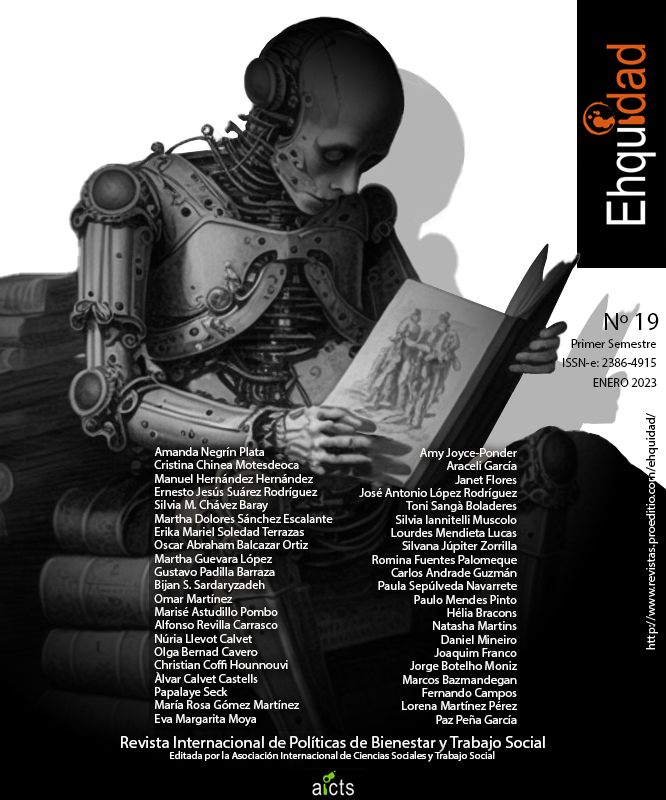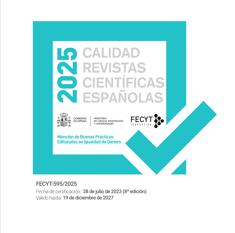Phenomenological review of the concept of empathy for Social Work
DOI:
https://doi.org/10.15257/ehquidad.2023.0006Keywords:
Social Work, Empathy, Intersubjectivity, Creation of meaning, phenomenologyAbstract
In the 21st century, social work faces the challenge to establish, using its own language, its object of knowledge. In this work, we delve into the concept of empathy by looking into contributions from the fields of Social Work, Aesthetics, Psychology, Psychoanalysis, Philosophy and the Neurosciences. The purpose of this article is to clarify the meaning assigned to the concept of empathy in Social Work. It is not possible to characterize this concept without evoking its phenomenological foundations. We consider possible attributions of the concept that could contribute to understand iatrogenic situations derived from professional praxis.
For the elaboration of the proposal, we developed a critical analysis of the concept of empathy, related to that of intersubjectivity, by carrying out a bibliographic review based on the aforementioned disciplines, covering a period from 1909 to 2018.
Lastly, the position of "cognitive empathy" is proposed as a strategy for understanding the intersubjective process.
Downloads
References
Anderson, H. (1999). Conversación, lenguaje y posibilidades?:un enfoque postmoderno de la terapia. In Biblioteca de psicología y psicoanálisis. Amorrortu.
Barthes, R. (2003). Cómo vivir juntos?: [simulaciones novelescas de algunos espacios cotidianos]?: notas de cursos y seminarios en el Collège de France, 1976-1977 / por Roland Barthes?; texto establecido, anotado y presentado por Claude Coste?; bajo la dirección de Éric Marty?; edición en español al cuidado de Beatriz Sarlo. Siglo XXI.
Batson, C. D. (2011). Altruism in Humans (O. U. Press (ed.).
Berger, P. L., y Luckmann, T. (1996). La Construcció social de la realitat?:un tractat de sociologia del coneixement (Vol. 2a). Herder.
Berkeley, G. (1989). Comentarios filosóficos?; Introducción manuscrita a los Principios del conocimiento humano?; Correspondencia con Johnson (G. Berkeley, S. Johnson, & J. A. Robles (eds.)) [Book]. Universidad Nacional Autónoma de México.
Bloom, P. (2018). Contra la empatía (Taurus).
Castillo Charfolet, A. (2016). La enseñanza y el aprendizaje de la empatía para el trabajo social. Universidad Complutense de Madrid.
Cuartero, M. E. (2018). Desgaste por empatía: cómo ser un profesional del trabajo social y no desfallecer en el intento. Revista Cuaderno de Trabajo Social, 11 (1), 9–31.
Decety, J & Cowell, J. M. (2014). Friends or Foes: Is Empathy Necessary for Moral Behavior? Perspectives on Psychological Science, 9, 525.
Delors, Jacques (1994). "Los cuatro pilares de la educación", en La Educación encierra un tesoro. México: El Correo de la UNESCO.
Eisenberg, N. (2000). Emotion, regulation and moral development. Annual Review of Psychology, 51, 665–697.
Freud, S. (1949). Grup psychology and the analysis of the ego (Liveringht).
Gardner, M., y Llosa, J. M. (2001). Los porque?s de un escriba filo?sofo. Tusquets Editores.
Garfinkel, H. (1967). Studies in ethnomethodology. Prentice-Hall.
Gergen, K. J. (2006). Construir la realidad?: el futuro de la psicoterapia. Paidós.
Hoffman, M., & Levine, L. (1976). Early sex differences in empathy. Desenvolopmental Psychology, 6, 557558.
Idareta-Goldaracena, F. (2010). Desde la compasión de J. Addams a la responsabilidad para con el otro: la propuesta ética de E. Lévinas para el Trabajo Social. Portularia Vol. X, 2, 65-75
Kant, I. 1724-1804. (1928). Crítica de la razón pura / por Manuel Kant?; traducción directa del alemán por Manuel G. Morente. Librería general de Victoriano Suárez.
Lipps, T. (1903). Einfühlung, inner Nachahmung, und Organ-empfindungen. Archiv Für Die Gesamte Psychologie, 2, 185–204.
Maturana, H. R. . 1928-. (1990). El Árbol del conocimiento?: las bases biológicas del conocimiento humano / Humberto Maturana, Francisco Varela. Debate.
Murphy, G. (1947). Personality: A biosocial approach to origins and structure (Harper).
Peirce, C. S. (Charles S. (1962). Pragmatism and pragmaticism?; Scientific metaphysics (C. S. (Charles S. Peirce, C. Hartshorne, & P. Weiss (eds.)) [Book]. Belknap Press of Harvard University Press.
Pettit, P. 1945-. (1999). Republicanismo?: una teoría sobre la libertad y el gobierno / Philip Pettit. Paidós Ibérica.
Rawls, J. (1995). Teorâia de la justicia: Vol. 2{u00AA}. Fondo de Cultura Económica.
Richmond, M. E., & Sociales, C. G. de C. O. de D. en T. S. y A. (2005). Diagnóstico social. Consejo General de Colegios Oficiales de Diplomados en Trabajo Social y Asistentes Sociales.
Rogers, C. (1959). A theory of therapy, personality, and impersonal relationship as developed in the centered framework. In Psychology: a study of a science (McGraw-Hil, Vol. 3).
Rogers, C. (1975). Empathic: An unappreciated way of begin. The Couselling Psychologist, 2, 2–10.
Schopenhauer, A. (2009). El mundo como voluntad y representación II (Trotta)
Schutz, A., & Luckmann, T. (1977). Las Estructuras del mundo de la vida. Amorrortu.
Searle, J. R. (2006). Social Ontology Some Basic Principles. Antropological Theory 6, 1, 12–29.
Smart, A. (2018). Más allá de ceros y unos (Clave inte).
Smith, A. (1982). The theory of moral sentiments (D. D. Raphael & A. L. Macfie (eds.)) [Book]. Liberty Classics.
Stein, E. (1995). Sobre el problema de la empati?a. Universidad Iberoamericana, Filosofía
Thomas, W. I. (1932). Child in America: behavior problems and programs / by William I. Thomas and Dorothy Swaine Thomas. Knopf.
Titchener, E. (1909). Experimental psychology of the thought processes (Macmillan).
Unamuno, M. de. (1993). Del sentimiento tra?gico de la vida?: en los hombres y en los pueblos. Espasa-Calpe.
Wind, E. (1963). Art and anarchy (Faber and).
Wispé, L. (1986). The distinction between sympathy and empathy: To call forth a concept a word is needed. Journal of Personality an Social Psychology, 9, 203–209.












